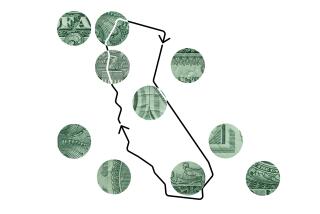Cranston Said to Hire Top Defense Lawyer
- Share via
WASHINGTON — Sen. Alan Cranston (D-Calif.) has retained Alan M. Dershowitz, the widely known criminal defense attorney and Harvard law professor, to defend him against misconduct charges at a possible trial before the Senate, according to knowledgeable sources.
Although the Senate Ethics Committee has not taken final action in the Cranston case, the senator’s decision to hire Dershowitz indicates that he expects the six-member panel to refer the matter to the full Senate.
Senate sources said that Cranston has told fellow senators of his plans to rely on Dershowitz to defend him. He faces charges of improperly intervening with federal regulators on behalf of Lincoln Savings & Loan in return for nearly $1 million in contributions made by Lincoln owner Charles H. Keating Jr. to the senator’s campaigns and other political causes.
Cranston, who strongly denies the charges, could not be reached for comment. Dershowitz did not return telephone calls.
Murray Flander, Cranston’s spokesman, said that the senator is undergoing medical tests at Stanford University Hospital and could not be reached. Flander said that he did not know whether Cranston had made an arrangement with Dershowitz.
Dershowitz, one of the best known appellate attorneys in the country, obtained the acquittal of socialite Claus von Bulow, who had been convicted of trying to murder his wife. The lawyer wrote a book about the case--”Reversal of Fortune”--which later became a movie.
By retaining Dershowitz, Cranston appeared to be making good on his pledge to mount an aggressive defense and perhaps to call into question the way all senators raise money. According to sources, Cranston has told his colleagues that his defense would be based on the notion that his actions were consistent with Senate practices.
Members of the Senate are especially sensitive to such criticism now, particularly after being assailed for mishandling the confirmation of Supreme Court Justice Clarence Thomas.
Earlier this year, Cranston dismissed his previous attorney, William W. Taylor III, on grounds that he did not have sufficient funds to continuing paying him. Cranston himself wrote his last brief in the case. It was not clear whether Cranston had agreed to pay Dershowitz, or whether the attorney had agreed to represent the senator free of charge.
But the senator reported not long ago that he had paid his lawyers $172,471 during the third quarter of the year with an influx of cash contributions into his legal defense fund. He reported receiving $141,187 in contributions during the quarter, virtually all of it from donors who had earlier received refunds from his now-defunct 1992 Senate campaign.
In recent weeks, members of the Ethics Committee have been meeting regularly in a renewed effort to reach a decision on Cranston, and sources said that they appeared to be moving toward a decision to send it to the Senate floor to be resolved.
Previously, the committee members were deadlocked, 3 to 3, on the question of whether to refer the case to the full Senate. Democrats had opposed it; Republicans favored a Senate trial.
The committee has delayed its final verdict since last February, when it ruled that it had found “substantial credible evidence” that the California senator had acted improperly in his dealings with Keating. At the same time, the panel dropped charges against four other members of the so-called “Keating Five”: Sens. John McCain (R-Ariz.), John Glenn (D-Ohio), Donald W. Riegle Jr. (D-Mich.) and Dennis DeConcini (D-Ariz.). Riegle and DeConcini received mild rebukes.
Cranston has acknowledged that on several occasions he and Keating discussed contributions at the same time that the Lincoln owner was seeking the senator’s help with federal regulators who were investigating Lincoln. But Cranston insisted that whenever he intervened on Keating’s behalf with regulators, he never did so because of contributions he had received.
Cranston also has said that while he pleaded Keating’s case with federal regulators, he did nothing that actually prevented the government from shutting down Lincoln. By the time the government finally seized Lincoln in April, 1989, its government-insured losses totaled about $2 billion.
The senator was said to be recuperating at his sister’s house in Palo Alto on Wednesday following medical tests related to radiation treatments he received late last year for prostate cancer.
More to Read
Get the L.A. Times Politics newsletter
Deeply reported insights into legislation, politics and policy from Sacramento, Washington and beyond. In your inbox twice per week.
You may occasionally receive promotional content from the Los Angeles Times.










